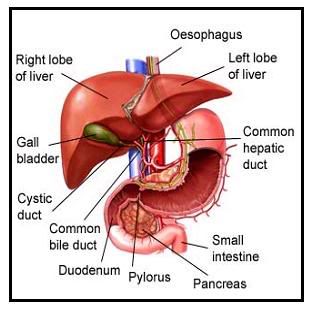 liver disease symptoms is a term for a set of conditions, diseases and infections that affect the cells, tissues, structure and function of the liver.
liver disease symptoms is a term for a set of conditions, diseases and infections that affect the cells, tissues, structure and function of the liver.Heart Function. Liver is an important organ located in the upper right abdomen kwadran. He is responsible for:
1. Filtering the blood
2. Create bile, a substance that helps the digestion of fat
3. Processing and binds fat in her carrier (protein), including cholesterol. Combined fat and protein called lipoproteins (Chylomicron, VLDL, LDL, HDL), save sugar and helps the body to transport and save energy.
4. Make important proteins, like most involved in blood clotting
5. Metabolizes many drugs such as barbiturates, sedatives, and amphetamines
6. Storing iron, copper, vitamins A and D, and some of the vitamin B
7. Make important proteins such as albumin, which regulates transport of fluid in the blood and kidney
8. To help break down and recycle cells, red blood if the liver becomes inflamed or infected, then the ability to perform these functions become weaker. Heart disease and infections are caused by a variety of conditions including viral infections, bacterial attack, and chemical or physical changes within the body. The most common cause of liver damage is malnutrition (malnutrition), particularly what happened with alcoholism.
Liver disease Symptoms may be acute, sudden, or chronic, developing slowly over a long period of time. Chronic liver disease is much more common than the acute. Figures from chronic liver disease than men are two times higher than women. Liver disease can reach from mild to severe depending on the type of disease present.
Signs and liver disease symptoms
The symptoms depend partly on the type and and scope of heart disease . In many cases, there may be no symptoms. The signs and symptoms - a common symptom in a number of different types of liver disease include:
* Jaundice or yellow skin
* Urine is brown like tea
* Nausea
* Lost appetite
* The loss or gain of abnormal body
* Vomiting
* Diarrhea
* Color stool (faeces) of pale
* Abdominal pain (stomach) at the upper right abdomen
* Not feeling well (malaise) or a vague feeling of illness
* Itching
* Varicose veins (enlarged veins)
* Fatigue
* Hypoglycemia (low blood sugar levels)
* Low-grade fever
* Muscle pain
* Decreased libido (decreased sexual desire)
* Depression
A less severe form of liver infection called acute fulminant hepatitis, causing liver failure. Symptoms - symptoms of heart failure include:
* Aplastic anemia, a condition in which bone marrow (bone marrow) can not make blood cells
* Ascites, fluid gathering in the abdomen
* Edema or swelling under the skin
* Encephalopathy, a disorder affecting the brain functions
* Heart of the enlarged and tender (ill)
* Enlarged spleen
* Changes in mental status or level of consciousness
* Vulnerable to hemorrhage
Causes and Risk Disease
Liver disease can be caused by factors that vary. Its causes include:
* Damage-innate damage or liver disorders are present at birth
* Metabolic disorders, disorder or damage to the body's basic processes
* Infection-viral or bacterial infection
* Alcohol or poisoning by toxins
* Terentu drugs that are toxic to the liver
* Malnutrition (nutritional)
* Trauma or injury




0 comments:
Post a Comment